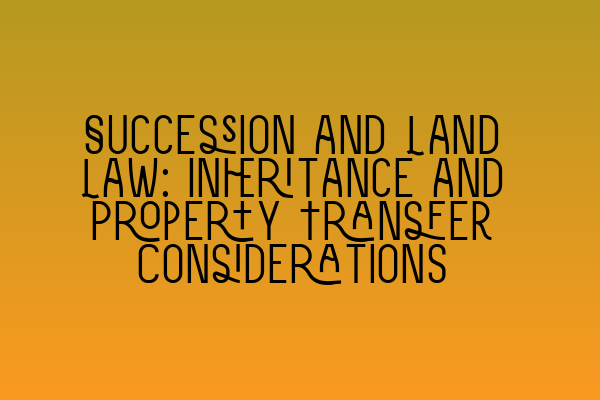Succession and Land Law: Inheritance and Property Transfer Considerations
When it comes to succession and land law, there are important considerations to keep in mind regarding inheritance and property transfer. Proper understanding and knowledge of these areas of law are crucial for individuals, families, and even businesses that deal with the ownership and transfer of land and property. In this article, we will explore key aspects of succession and land law, discussing the process of inheritance and the various considerations involved in property transfer.
Understanding Succession Law
Inheritance is a legal process through which property, rights, and obligations are passed from one person (the deceased) to another (the heir or beneficiary). Succession law governs this process, ensuring a fair and orderly transfer of assets and ensuring that the wishes of the deceased, as stated in their will or through legal provisions, are respected.
Succession law encompasses various legal instruments and concepts, including wills, trusts, intestacy (when someone dies without a will), and probate (the legal process of administering the estate of a deceased person). It is crucial to understand these elements to navigate the complexities of inheritance and property transfer.
Wills
A will is a legal document that allows an individual (the testator) to specify how they want their assets to be distributed after their death. It typically designates beneficiaries who will inherit specific assets or shares of the estate. Creating a will is important for anyone who wants to have control over the distribution of their assets and avoid potential disputes among surviving family members.
It is essential to ensure that a will is valid and legally binding. Factors such as the testator’s mental capacity, the presence of witnesses, and compliance with formalities play a vital role in determining the validity of a will. Seeking professional legal advice can help ensure that your will is drafted correctly and in accordance with the law.
Intestacy and Probate
If someone dies without a valid will, their estate is distributed according to the rules of intestacy. These rules vary depending on the jurisdiction, but they generally prioritize close family members, such as spouses, children, and parents, as beneficiaries. Understanding the intestacy rules in your jurisdiction is important, as it can significantly impact how your assets will be distributed if you die without a will.
Probate is the legal process that validates and administers the estate of a deceased person. It involves gathering and valuing assets, paying any outstanding debts or taxes, and distributing the remaining estate to the beneficiaries. Probate can be a complex and time-consuming process, particularly for larger or more complicated estates. Seeking legal guidance during this process is highly recommended to ensure compliance with legal requirements and efficient estate administration.
Property Transfer Considerations
In addition to understanding succession law, it is crucial to consider the various legal aspects involved in transferring property. Whether you are buying, selling, or gifting property, certain considerations must be taken into account to ensure a smooth and legally sound transfer of ownership.
Legal Ownership and Title
Before transferring property, it is essential to establish clear legal ownership and ensure that the title is free from encumbrances or disputes. Conducting a comprehensive title search and obtaining title insurance can help identify any potential issues that may affect the transfer of the property. This step is crucial to safeguard the rights of both buyers and sellers and mitigate any future disputes.
Taxes and Liabilities
Property transfers often involve tax implications and potential liabilities. For example, capital gains tax may be applicable if the property’s value has increased since its acquisition. Understanding the tax implications and seeking professional advice, such as a tax lawyer or accountant, can help minimize tax obligations and ensure compliance with tax laws.
Liabilities, such as outstanding mortgages or liens, should also be carefully considered during a property transfer. Clearing any debts or encumbrances on the property is essential to ensure a clean transfer of ownership.
Legal Documentation and Contracts
Proper legal documentation and contracts are key to a successful property transfer. Whether it is a purchase agreement, a deed, or a contract for gifting property, ensuring that all necessary documents are drafted correctly and reflect the intentions of both parties is crucial. Legal guidance can help navigate the complexities of these documents and ensure that all legal requirements are met.
Consult a Property Law Professional
To navigate the intricacies of succession and land law, it is highly recommended to seek the assistance of a qualified property law professional. A solicitor with expertise in property law can provide valuable guidance throughout the inheritance process and property transfer, ensuring compliance with relevant laws and safeguarding your rights and interests.
At SQE Property Law & Land Law, we are experts in property law and can assist you with all your succession and property transfer needs. Contact us today to receive professional guidance and support.
